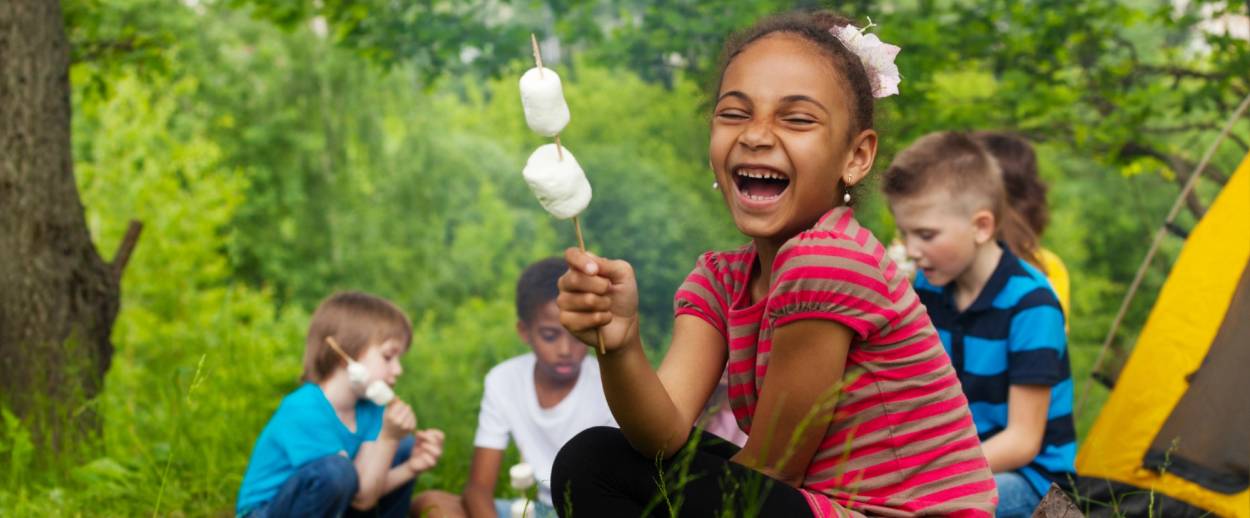Jewish Camping 101
Thinking of hitting the trail before summer’s out? Here’s a guide on how to celebrate your faith while pitching a tent on Shabbat.




Summer may be almost over, but there’s still plenty of time left to experience the great outdoors. The trees are lush and green, the ponds are lukewarm, and the insects on the trails have even calmed down from their frenzied biting. Have you always wondered what the stars look like at night in the forest? Go and find out!
To be surrounded by all of the colors, sights, and smells of nature, where you don’t feel alone but are free from frustrating questions, stares, and judgments, is incredibly liberating. For all Jews this can bring a sigh of relief; for Jews of Color, who are often on the receiving end of these unfortunate occurrences (even in our safe Jewish spaces), even more weight is lifted. But as it turns out, 88% of the nearly 300 million people who visited American national parks in 2014 are not people of color, let alone Jews of color. (See this Colorlines article titled, “Why People of Color Don’t Frequent National Parks,” inspired by a recent New York Times article, titled “Why Are Our Parks So White?”)
So where are we, and why aren’t we taking advantage of the beautiful wonders that nature has to offer? While the warmth of summer and autumn are still here, enjoy a camping trip, a hike, or even just a basket lunch in the park because state and national parks are paid for by your tax dollars anyway, so take advantage! Here are few ways to put your own Jewish twist on engaging with the outdoors.
Jewish camping is easy and fun, even while adhering to the Torah’s laws. One of my personal biggest struggles while growing in Torah observance (I was raised Reform, and am now shomer mitzvot) centered on my favorite outdoor activities. When I committed to observing skirt-wearing as an aspect of tzniut, I announced to my future husband and anybody else that would listen that I would always wear pants for snowboarding, horseback riding, and hiking. Yet, when I finally went camping for the first time since taking on the practice, another skirt-clad woman showed me that it’s really easy to hike safely and freely in skirts. Many outdoor companies even make hiking skirts! Maintaining modesty was easy, and hiking skirts are made from materials that allow free movement, wick away sweat, won’t tangle in the underbrush, and have plenty of pockets for hiking essentials, like cell phone, identification, pocket knife, and compass.
Last summer, a group of us went Shabbat camping. We built an eruv using bamboo poles, some nails, and some fishing wire. (Consult your rabbi for the appropriate way to do this). Things we learned: make sure you leave at least 3 hours just to build the eruv if you plan on going camping over Shabbat and have never built one before; and two more hours to set up the campsite. A tent can be set up in 20 minutes or less, but without practice it can take an hour. Also, you’ll want to make sure your food is cooked or appropriately set up and all of your supplies ready-to-go, including your Shabbat supples. And at the end, no matter how you celebrate your Judaism, making havdalah around a campfire is an unforgettable experience.
When bringing children—whether teenagers or toddlers—it’s easy to bring Jewish learning into outdoor activities. Use nature to create beautiful works of Judaica. Make leaf rubbings (for younger kids, for older kids) or pinecone pictures in the shape of a Star of David, or use a hike to talk with your kids about the Jews who wandered through the desert, or to talk about how much space you could save in your daypack if manna was dropping from heaven and Miriam’s well followed you around! A safety discussion of the kinds of animals found in the wilderness can also include a discussion of the ways Jews interact with animals, from the laws of kashrut to how we’re commanded to interact with animals on a daily basis, such as shiluach hakan, sending away the mother bird.
Camping, hiking in national parks requires precautions. Consult lists for safety suggestions, such as a first aid kit and whistle. And while the following tips are a good extra mile for all participants, for JoCs, as people of color, here are a few extra safety tips. Ask for any type of help from campground neighbors and fellow hikers (most people are friendlier outdoors then at home!) However, exercise caution and good common sense, i.e. don’t knock on a fellow tenter’s door late at night without surrounding yourself with good lighting, such as a lantern or strong flashlight, rather than a headlamp, which can come across as aggressive). Park rangers are your friend, and adhering to the principles of “Leave No Trace” will help keep relationships with rangers positive. Call ahead to your campground or ranger station and establish a relationship ahead of your trip. Go as a group; bring family, or a close friend.
Lastly, help your synagogue organize a trip to a close-by campground or even a short hike on established trails. To get your outdoor adventures started, check out the NPS’s Find Your Park. See you on the trails!
Shoshana Ne’ora Rishon, the daughter of a German Jewish mother and Black Catholic father, is a biracial advocate, interracial & inter-religious family adviser, and general race conversationalist. She blogs, speaks publicly, and runs classes for interracial families on socio-racial identity development. She (reluctantly) lives in Brooklyn with her husband and daughter.